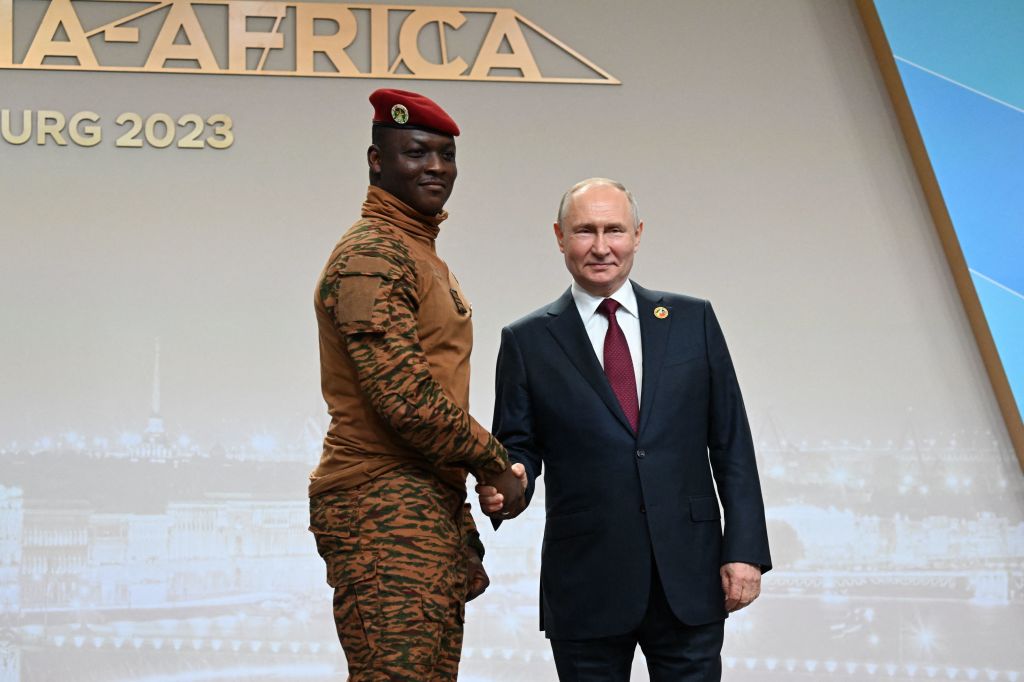ADF STAFF
Russia’s extensive courtship of Burkina Faso in recent months has included 25,000 metric tons of free wheat, an agreement to build a nuclear power plant, a personal security detail for junta leader Capt. Ibrahim Traoré and now 100 paramilitary fighters.
But experts warn that the former Wagner Group mercenary outfit, now known as the Africa Corps, has a history of indiscriminately killing civilians and plundering natural resources from its host countries.
“[The Russians are] pursuing and defending their own national interests,” Rwanda-based political analyst Louis Gitinywa told Anadolu Agency. “It doesn’t matter what they are putting on the table. … The African continent cannot rely on foreign powers to maintain national security.”
The contingent of Russian military personnel arrived with weapons and equipment in the capital, Ouagadougou, on January 24. The deployment was announced on the Telegram messaging app’s Africa Corps channel, which claims to be affiliated with Russia’s Defense Ministry.
“A Russian contingent of 100 people will ensure the safety of the country’s leader, Ibrahim Traoré, and the Burkinabe people from terrorist attacks,” the statement read. “In the near future, the units will be replenished with another 200 military personnel from Russia.”
The “military specialists” will train Burkinabe forces and patrol dangerous areas, according to a statement on Telegram by The Africa Initiative, a pro-Russia news agency.
The Africa Corps is a repackaging of the infamous Wagner Group, which has been dogged by accusations and credible evidence of massacres, rape, torture, theft and smuggling across the continent.
Foreign Policy magazine reported that the Russian Defense Ministry has “been in the process of subsuming Wagner operations in Mali, Libya, and to a lesser degree in the Central African Republic for some months now.”
“The change from Wagner to Africa Corps also marks a new phase in Russia’s export of security to Africa,” the magazine reported on February 7. “Africa Corps differs from Wagner primarily in its official government status.
“With this shift, Russia’s interventions on the continent are emerging out of the shadows of private initiative and into the limelight of official state project.”
Since Burkina Faso’s junta took power in September 2022, it has failed to restore security for civilians facing a bloody insurgency by multiple groups of extremist militants that control large swaths of the country.
Traoré and his transitional government have tried to bolster the Burkinabe military by recruiting civilians into the controversial Volunteers for the Defense of the Homeland militia, sometimes through forced conscription.
In need of his own protection, Traoré has turned to Russia since the September 2023 arrest of several Burkinabe military officers accused of plotting a coup.
“Since this incident, they are very concerned about their security and are convinced that their security apparatus needs reinforcing,” a highly placed regional source told The Africa Report magazine.
“There is a small team that has been set up at the palace to secure the president, led by his brother and special advisor, Inoussa Traoré,” a security source added. “They distrust everyone.”
For decades, former colonial power France provided training and security assistance to Burkina Faso. As in Mali and Niger, Russian propaganda campaigns helped persuade junta leaders to oust French forces. Those security roles now are being filled by a neo-colonial power in Russia.
“The interventions of Russian services, be it in Niger, Mali or Burkina Faso, first and foremost serve the purpose of protecting the regimes and only to a lesser degree to fight against jihadis,” French military analyst Gen. Dominique Trinquand told Deutsche Welle.
Freddie Egesa, a security analyst based in Uganda’s capital, Kampala, said that like the Wagner Group before it, the Africa Corps’ interests on the continent are financial and political.
“Russia is keen to maintain foreign influence through military interventions, which also serves to safeguard its commercial business interests,” he told Anadolu Agency.
Between 2018 and 2022, 40% of Africa’s weapons imports were from Russia, according to the Stockholm International Peace Research Institute. A 2022 report by the Rand Corp. think tank said Russian “weapons sales and transfers to African countries in recent years have increased from approximately $500 million to more than $2 billion annually.”
Gitinywa does not believe that Russia genuinely cares about Africa.
“It would be naive to think that Russia has a very legitimate concern about Africa or about its people or about their development,” he said. “The only reliable partnership is by African countries trying to walk hand in hand in order to push our national interests.”

